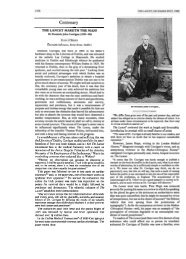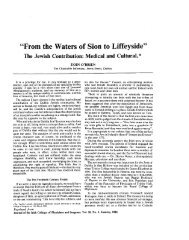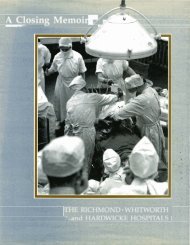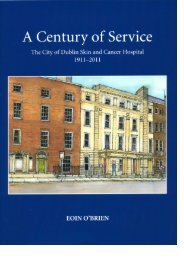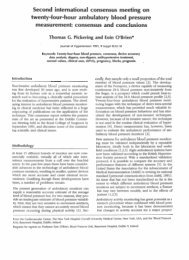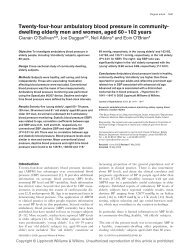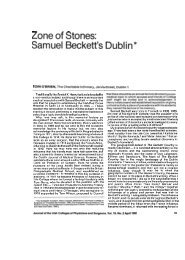Nevill Johnson: Paint the smell of grass - Eoin O'Brien
Nevill Johnson: Paint the smell of grass - Eoin O'Brien
Nevill Johnson: Paint the smell of grass - Eoin O'Brien
Create successful ePaper yourself
Turn your PDF publications into a flip-book with our unique Google optimized e-Paper software.
Then two happenings changed <strong>the</strong> course <strong>of</strong> his life. He met<br />
and married Margaret Pettigrew-King (alias Jenny in The O<strong>the</strong>r Side<br />
<strong>of</strong> Six): “Notwithstanding <strong>the</strong> requirements <strong>of</strong> legitimacy and <strong>the</strong><br />
laws <strong>of</strong> property, I believed in divorce no more than I believed in<br />
marriage. The oaths and <strong>the</strong> written bonds, <strong>the</strong> witnessed<br />
registration <strong>of</strong> belonging, <strong>the</strong> receipts and waybills FOB, <strong>the</strong> licence<br />
to copulate – <strong>the</strong>se were repugnant to me, an affront to <strong>the</strong> honesty<br />
<strong>of</strong> private declaration. We were married on a thundery afternoon at<br />
<strong>the</strong> registry <strong>of</strong>fice at Eye, Norfolk. Clad in torn jeans and jungle<br />
boots, I promised to cherish and protect, gaining <strong>the</strong>reby an oath<br />
<strong>of</strong> loyalty from Jenny.”<br />
He also inherited a little money with which he purchased four Margaret Pettigrew-King<br />
cottages at Wilby Green, near Framlingham. “I had become a<br />
squireen, lord and master <strong>of</strong> fourteen rooms, four front doors and four privies.” Here he found<br />
solace and inspiration, in working <strong>the</strong> land and in communion with animals. He returned to<br />
painting: “There followed a spring stunned with cold, and few birds left to greet it. O<strong>the</strong>rs<br />
perished that year: Georges Braque, Robert Frost, Jean Cocteau. I lived on, hoeing, digging,<br />
building and now painting again.”<br />
During this period <strong>Johnson</strong> kept a diary, which unlike The O<strong>the</strong>r Side <strong>of</strong> Six, is a very private<br />
chronicle without editing for publication, and, as such, is all <strong>the</strong> more valuable in permitting<br />
insight into <strong>the</strong> mind <strong>of</strong> <strong>the</strong> artist grappling with <strong>the</strong> artistic process, its joys and vicissitudes. The<br />
proximity <strong>of</strong> nature, <strong>the</strong> seasons however harsh betimes, <strong>the</strong> soil and animals, dominant <strong>the</strong>mes<br />
in <strong>the</strong> diary, provide it would seem an ambience conducive to artistic expression, or at worst to<br />
contemplating how best to go about painting. “Up at 7. The usual chore. Tea. Washingwater.<br />
Make <strong>the</strong> fire. Strong west wind, cool, good promise. Kitten shit everywhere. Biddy not well.<br />
“There was comfort and fun in <strong>the</strong> company <strong>of</strong> many friends who invaded <strong>the</strong> cottages at Wilby<br />
knowing that a kindred spirit lay inside: “Constructed splendid cat walk for East window to bypass<br />
painting table. Fully signed and directed.”It is interesting to see <strong>the</strong> artist instil into words<br />
<strong>the</strong> colours and <strong>the</strong> nuances <strong>of</strong> <strong>the</strong> canvas: “Great skies. Thunder showers. Overpowering<br />
cumulus. Great snowy-breasted goose galleons <strong>of</strong> clouds. Greens and blues electric, <strong>the</strong> barley<br />
fear-pale.” Solitude was ano<strong>the</strong>r boon though at times this weighed heavily: “There is too much<br />
to enjoy alone. It is unbearable.”<br />
At Wilby <strong>Johnson</strong> was able to indulge himself in reading and importantly to leave us some<br />
record as to what moved him in literature. He may have seen much <strong>of</strong> self in <strong>the</strong> disillusioned and<br />
exiled protagonist in Malcolm Lowry’s “compelling” novel Under <strong>the</strong> Volcano. He was also drawn<br />
to books on gardening, house building and magic, especially <strong>the</strong> “fascinating” Conjuror’s<br />
130 <strong>Nevill</strong> <strong>Johnson</strong> l <strong>Paint</strong> <strong>the</strong> Smell <strong>of</strong> Grass<br />
Magazine <strong>of</strong> 1793 with a translation <strong>of</strong> Johann Caspar Lavater’s Essays on Physiognomy designed to<br />
promote <strong>the</strong> knowledge and <strong>the</strong> love <strong>of</strong> mankind, which had so fascinated Goe<strong>the</strong> and William Blake<br />
among many contemporary intellectuals. And in <strong>the</strong> background philosophers, such as Henry<br />
David Thoreau emerge from time to time: “A great cheerfulness have all great arts possessed,<br />
almost a pr<strong>of</strong>ane levity to such as understood <strong>the</strong>m not. But <strong>the</strong>ir religion had a broader basis in<br />
proportion as it was prominent. The clergy are as diseased, in as much possessed with a devil as <strong>the</strong><br />
reformers. They make <strong>the</strong>ir topic as <strong>of</strong>fensive as <strong>the</strong> politician, for our religion is as impatient and<br />
incommunicable as our poctrial vein, and to be approved with as much love and tenderness!”<br />
<strong>Johnson</strong> was not much influenced by fellow artists but he did respect Robert MacBryde and<br />
Robert Colquhoun <strong>of</strong> whom he wrote: “The local paper talks about McColquhoun <strong>the</strong> artist,<br />
now showing (God help him, with <strong>the</strong> advanced demographers <strong>of</strong> Museum Street). And Mr<br />
MacBryde. Don’t mind Robert can still draw. I’ve seen <strong>the</strong>m. Don’t mind his company. OR his<br />
friends. And don’t mind Picasso ei<strong>the</strong>r.” Then on March 21st <strong>the</strong> Diary records: “ Robert is dead.<br />
Collapsed & died in studio above museum gallery says East Anglian. Dear Jesus. Poor MacB.<br />
Poor everyone.” <strong>Johnson</strong>, never one given to expressing emotion, was deeply upset by this event:<br />
“Rang S’OB from <strong>the</strong> Crown - it’s true he’s dead. More need to live. To use <strong>the</strong> time. O Jesus.<br />
I’m sad for him for him. This rare beautiful man. 47 for Gods sake. Idiot. Lovely man. Est is<br />
Bandt.” And later: “I’m near to painting - nearer to Robert.” O<strong>the</strong>r contemporaries in <strong>the</strong> art<br />
world get scant if not derogatory mention: “Hockney (pop) shows at KASMIN. New Bond St<br />
Print Centre. Holland Street. W.8” And Anne Yeats who had trudged behind <strong>Nevill</strong> and his Leica<br />
in Dublin and who journeyed loyally to Wilby receives <strong>the</strong> following: “Anne Yeats entrained at<br />
Diss at 12.45. Nice, nice woman, but doglike. Mean <strong>of</strong> me, but so much to do - and so much<br />
treacle. Each way I even look, she looks. Like a mirror, and I’m not that pretty now.”<br />
Much <strong>of</strong> <strong>the</strong> Wilby diary is devoted to painting, or ra<strong>the</strong>r <strong>the</strong> difficulty <strong>Johnson</strong> had in<br />
bringing himself to paint. Lack <strong>of</strong> <strong>the</strong> means whereby to exist is a constant thread in <strong>Johnson</strong>’s<br />
life: “It is not just <strong>the</strong> sheer indignity <strong>of</strong> poverty. It inhibits and desensitizes. Wastes such precious<br />
time. Months <strong>of</strong> scratching instead <strong>of</strong> painting. It’s really sordid and angry-making. So I’m<br />
supposed to be decorating a house this weekend. And panels waiting. And waiting for Alf who<br />
waits for his money. And uncertain I am about <strong>the</strong> club/studio in Hertart St – all because <strong>of</strong> £4<br />
a week. So I jump and take it and get working.” <strong>Johnson</strong> never shied from menial work, if for no<br />
o<strong>the</strong>r reason that he <strong>of</strong>ten had no alternative: “Alf <strong>of</strong>fers £2 a week – and a daily meal if I lock<br />
myself in. He really means this. The arm still fairly useless but signed <strong>of</strong>f <strong>the</strong> sick & onto <strong>the</strong><br />
labour. Offered work as messenger or parking meter attendant! No benefits, 20 years <strong>of</strong><br />
contribution <strong>of</strong> no avail. Finished painting for <strong>Johnson</strong>. Minimal existence possibility, but I will<br />
dig in regardless.”Procrastination dominates <strong>the</strong> Wilby diaries. Tomorrow will be fine for painting<br />
but not today. “So much I owe in work and time. Surely I can break through <strong>the</strong>se paper bags &<br />
A Personal Memoir l <strong>Eoin</strong> O’Brien 131



